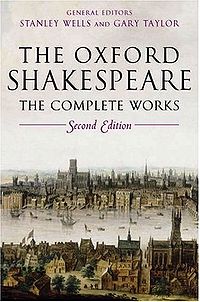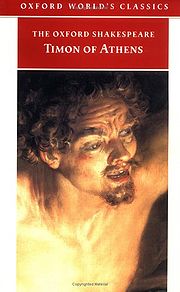
The Oxford Shakespeare
Encyclopedia

William Shakespeare
William Shakespeare was an English poet and playwright, widely regarded as the greatest writer in the English language and the world's pre-eminent dramatist. He is often called England's national poet and the "Bard of Avon"...
's works produced by Oxford University Press
Oxford University Press
Oxford University Press is the largest university press in the world. It is a department of the University of Oxford and is governed by a group of 15 academics appointed by the Vice-Chancellor known as the Delegates of the Press. They are headed by the Secretary to the Delegates, who serves as...
. The Oxford Shakespeare is produced under the general editorship of Stanley Wells
Stanley Wells
Stanley William Wells, CBE, is a Shakespeare scholar and Chairman of the Shakespeare Birthplace Trust.Wells took his first degree at University College, London, and was awarded an honorary DLitt by the University of Warwick in 2008...
and Gary Taylor
Gary Taylor (English literature scholar)
Gary Taylor is George Matthew Edgar Professor of English at Florida State University, author of numerous books and articles, and joint editor of the Oxford Shakespeare and .-Life:...
.
The Complete Works
The series includes The Complete Works, a single-volume modern-spelling edition first published in 1891; the first editor was William James CraigWilliam James Craig
William James Craig was an editor of Shakespeare's plays who produced the first Oxford Shakespeare for the Oxford University Press.-Early life:...
. The second edition, edited by John Jowett, William Montgomery, Gary Taylor and Stanley Wells, appeared in 1986. It includes all of Shakespeare's plays and poems, as well as a biographical introduction. Each work is given a single-page introduction. There are no explanatory notes, but there is a glossary
Glossary
A glossary, also known as an idioticon, vocabulary, or clavis, is an alphabetical list of terms in a particular domain of knowledge with the definitions for those terms...
at the back of the book.
The Oxford Shakespeare differs from other Shakespeare editions in attempting to present the text as it was first performed, rather than as it was first printed. This resulted in many controversial choices: for example, presenting Hamlet with several famous speeches relegated to appendices on the grounds that Shakespeare added them after the original performances; presenting two separate texts of King Lear due to the drastic differences between the two extant texts; and changing the name of Falstaff in Henry IV Part One to 'Oldcastle' due to historical evidence that this name was used in the first performances even though it never survived to print.
The Oxford Complete Works was the first to emphasize Shakespeare's collaborative work, describing Macbeth
Macbeth
The Tragedy of Macbeth is a play by William Shakespeare about a regicide and its aftermath. It is Shakespeare's shortest tragedy and is believed to have been written sometime between 1603 and 1607...
, Measure for Measure
Measure for Measure
Measure for Measure is a play by William Shakespeare, believed to have been written in 1603 or 1604. It was classified as comedy, but its mood defies those expectations. As a result and for a variety of reasons, some critics have labelled it as one of Shakespeare's problem plays...
and Timon of Athens
Timon of Athens
The Life of Timon of Athens is a play by William Shakespeare about the fortunes of an Athenian named Timon , generally regarded as one of his most obscure and difficult works...
as either collaborations with or revisions by Thomas Middleton
Thomas Middleton
Thomas Middleton was an English Jacobean playwright and poet. Middleton stands with John Fletcher and Ben Jonson as among the most successful and prolific of playwrights who wrote their best plays during the Jacobean period. He was one of the few Renaissance dramatists to achieve equal success in...
; Pericles
Pericles, Prince of Tyre
Pericles, Prince of Tyre is a Jacobean play written at least in part by William Shakespeare and included in modern editions of his collected works despite questions over its authorship, as it was not included in the First Folio...
as a collaboration with George Wilkins
George Wilkins
George Wilkins was an English dramatist and pamphleteer best known for his probable collaboration with Shakespeare on the play Pericles, Prince of Tyre. By profession he was an inn-keeper, but he was also apparently involved in criminal activities.-Life:Wilkins was an inn-keeper in Cow-Cross,...
; Henry VI Part One as a collaboration with several unknown other dramatists; and Henry VIII
Henry VIII (play)
The Famous History of the Life of King Henry the Eight is a history play by William Shakespeare and John Fletcher, based on the life of Henry VIII of England. An alternative title, All is True, is recorded in contemporary documents, the title Henry VIII not appearing until the play's publication...
and The Two Noble Kinsmen
The Two Noble Kinsmen
The Two Noble Kinsmen is a Jacobean tragicomedy, first published in 1634 and attributed to John Fletcher and William Shakespeare. Its plot derives from "The Knight's Tale" in Geoffrey Chaucer's The Canterbury Tales....
as collaborations with John Fletcher
John Fletcher (playwright)
John Fletcher was a Jacobean playwright. Following William Shakespeare as house playwright for the King's Men, he was among the most prolific and influential dramatists of his day; both during his lifetime and in the early Restoration, his fame rivalled Shakespeare's...
. It also broke with tradition in presenting Shakespeare's works in chronological order, rather than dividing them by genre.
In 2005, a second edition of the Complete Works was produced. It adds a full text of Sir Thomas More
Sir Thomas More (play)
Sir Thomas More is a collaborative Elizabethan play by Anthony Munday and others depicting the life and death of Thomas More. It survives only in a single manuscript, now owned by the British Library...
(edited by John Jowett), which may contain passages by Shakespeare, and Edward III
Edward III (play)
The Reign of King Edward the Third is an Elizabethan play printed anonymously in 1596. It has frequently been claimed that it was at least partly written by William Shakespeare, a view that Shakespeare scholars have increasingly endorsed. The rest of the play was probably written by Thomas Kyd...
(edited by William Montgomery), another play believed to be partly by Shakespeare.
The Norton Shakespeare, published by W.W. Norton, is largely based on the Oxford text, but departs from some of its decisions.
Other components

The term 'Oxford Shakespeare' also refers to Oxford University Press's editions of individual Shakespeare plays and poems. The Oxford individual editions follow the same principles as the Complete Works, although their editors are permitted to reject choices made for the Complete Works if they feel strongly; for example, David Bevington
David Bevington
David Martin Bevington is an American literary scholar. He is Professor Emeritus in the Humanities and in English Language & Literature, Comparative Literature, and the College at the University of Chicago, where he has taught since 1967, as well as chair of Theatre and Performance Studies...
's edition of Henry IV Part One uses 'Falstaff' not 'Oldcastle'. The hardback editions feature distinctive purple dustjackets, while the paperbacks follow the design of the Oxford World's Classics
Oxford World's Classics
Oxford World's Classics is an imprint of Oxford University Press. First established in 1901 by Grant Richards and purchased by the Oxford University Press in 1906, this imprint publishes primarily dramatic and classic literature for students and the general public...
editions of classic literature.

